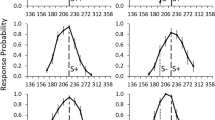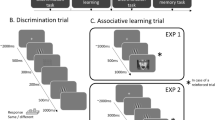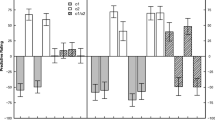Abstract
Studies of perceptual generalization have recently demonstrated a close relationship between stimulus perception and conditioned responding, suggesting that incorrect stimulus perception might account for certain characteristics of generalization gradients. In this study, we investigated whether common phenomena, such as the area and peak shift in conditioned responding, relate to perceptual errors. After a differential conditioning procedure, in which one circle was paired with the presentation of an aversive picture whereas a different-sized circle was not, we combined a generalization test with a three-alternative forced-choice perceptual categorization task where participants had to indicate on every trial whether the presented circle was one of the two circles from the conditioning phase or a different one, after which US-expectancy ratings were collected. The typical peak and area shift were observed when conditioned responses were plotted on a physical dimension. However, when stimulus perception was incorporated generalization gradients diverged from the typical gradient. Both the area and peak shift largely disappeared when accounting for perceptual errors. These findings demonstrate the need to incorporate perceptual mechanisms in associative models.





Similar content being viewed by others
Data availability
Data are available on the open science framework.
Notes
These averages are based on only 12% of the participants, as the majority failed to provide an unpleasantness rating due to a relatively short response window. In a study by Grühn and Scheibe (2008) the same USs received the following ratings in a sample of young adults: the most aversive US was rated as a 7.77 on arousal (1 = calm, 9 = excited) and as a 1.77 on valence (1 = unpleasant, 9 pleasant), the mild aversive US received an arousal rating of 5.86 and a valence rating of 3.14 and the mildly aversive US was rated as a 4.92 on arousal and as a 3.65 for valence (Grühn & Scheibe, 2008).
Corrected with a factor 3 for multiple testing.
Exclusion of subjects (N = 11) that seem to have switched the meaning of the response buttons [accuracies both for CS + and CS- trials < 40%, mean accuracy: CS + = 15.62% (SE = 4%), CS- = 13.42% (SE = 4%)] did not meaningfully change the results.
Corrected with a factor of 3 for multiple testing.
Corrected with a factor of 4 for multiple testing.
References
Åhs, F., Miller, S. S., Gordon, A. R., & Lundström, J. N. (2013). Aversive learning increases sensory detection sensitivity. Biological Psychology, 92(2), 135–141. https://doi.org/10.1016/j.biopsycho.2012.11.004.
Aizenberg, M., & Geffen, M. N. (2013). Bidirectional effects of aversive learning on perceptual acuity are mediated by the sensory cortex. Nature Neuroscience, 16(8), 994–996. https://doi.org/10.1038/nn.3443.
Blackwell, E., de Leon, C. F. M., & Miller, G. E. (2006). Applying mixed regression models to the analysis of repeated-measures data in psychosomatic medicine. Psychosomatic Medicine, 68(6), 870–878. https://doi.org/10.1097/01.psy.0000239144.91689.ca.
Blough, D. (1969). Generalization gradient shape and summation in steady-state tests. Journal of the Experimental Analysis of Behavior, 12(1), 91–104. https://doi.org/10.1901/jeab.1969.12-91.
Blough, D. S. (1975). Steady sate data and a quantitative model of operant generalization and discrimination. Journal of Experimental Psychology: Animal Behavior Processes, 1(1), 3–21.
Boddez, Y., Baeyens, F., Luyten, L., Vansteenwegen, D., Hermans, D., & Beckers, T. (2013). Rating data are underrated: Validity of US expectancy in human fear conditioning. Journal of Behavior Therapy and Experimental Psychiatry, 44(2), 201–206. https://doi.org/10.1016/j.jbtep.2012.08.003.
Ceulemans, E., & Kiers, H. A. L. (2006). Selecting among three-mode principal component models of different types and complexities: A numerical convex hull based method. British Journal of Mathematical and Statistical Psychology, 59(1), 133–150. https://doi.org/10.1348/000711005X64817.
Davis, T., & Love, B. C. (2010). Memory for category information is idealized through contrast with competing options. Psychological Science, 21(2), 234–242. https://doi.org/10.1177/0956797609357712.
Dunsmoor, J. E., & Murphy, G. L. (2015). Categories, concepts, and conditioning: how humans generalize fear. Trends in Cognitive Sciences, 19(2), 73–77. https://doi.org/10.1016/j.tics.2014.12.003.
Dunsmoor, J. E., White, A. J., & LaBar, K. S. (2011). Conceptual similarity promotes generalization of higher order fear learning. Learning & Memory (Cold Spring Harbor, NY), 18(3), 156–160. https://doi.org/10.1101/lm.2016411.
Dymond, S., Dunsmoor, J. E., Vervliet, B., Roche, B., & Hermans, D. (2015). Fear generalization in humans: systematic review and implications for anxiety disorder research. Behavior Therapy, 46(5), 561–582. https://doi.org/10.1016/j.beth.2014.10.001.
Feather, B. W. (1965). Semantic generalization of classically conditioned responses: A review. Psychological Bulletin, 63(6), 425–441. https://doi.org/10.1037/h0022003.
Ghirlanda, S., & Enquist, M. (2003). A century of generalization. Animal Behaviour, 66(1), 15–36. https://doi.org/10.1006/anbe.2003.2174.
Grühn, D., & Scheibe, S. (2008). Age-related differences in valence and arousal ratings of pictures from the International Affective Picture System (IAPS): Do ratings become more extreme with age? Behavior Research Methods, 40(2), 512–521. https://doi.org/10.3758/BRM.40.2.512.
Hanson, H. M. (1957). Discrimination training effect on stimulus generalization gradient for spectrum stimuli. Science, 125(3253), 888–889. https://doi.org/10.1126/science.125.3253.888.
Hanson, H. M. (1959). Effects of discrimination training on stimulus generalization. Journal of Experimental Psychology, 58(5), 321–334. https://doi.org/10.1037/h0042606.
Hanson, H. M. (1961). Stimulus generalization following three-stimulus discrimination training. Journal of Comparative and Physiological Psychology, 54(2), 181–185. https://doi.org/10.1037/h0041866.
Hofmans, J., Ceulemans, E., Steinley, D., & Van Mechelen, I. (2015). On the added value of bootstrap analysis for K-means clustering. Journal of Classification, 32(2), 268–284. https://doi.org/10.1007/s00357-015-9178-y.
Holt, D. J., Boeke, E. A., Wolthusen, R. P. F., Nasr, S., Milad, M. R., & Tootell, R. B. H. H. (2014). A parametric study of fear generalization to faces and non-face objects: Relationship to discrimination thresholds. Frontiers in Human Neuroscience, 8(SEP), 1–12. https://doi.org/10.3389/fnhum.2014.00624.
Honig, W. K., & Urcuioli, P. J. (1981). The legacy of Guttman and Kalish (1956): Twenty-five years of research on stimulus generalization. Journal of the Experimental Analysis of Behavior, 36(3), 405–445. https://doi.org/10.1901/jeab.1981.36-405.
Jäkel, F., Schölkopf, B., & Wichmann, F. A. (2008). Generalization and similarity in exemplar models of categorization: Insights from machine learning. Psychonomic Bulletin and Review, 15(2), 256–271. https://doi.org/10.3758/PBR.15.2.256.
Kruschke, J. K. (1992). ALCOVE: An exemplar-based connectionist model of category learning. Psychological Review, 99(1), 22–44. https://doi.org/10.1037/0033-295X.99.1.22.
Lang, P. J., Bradley, M. M., & Cuthbert, B. N. (2008). International affective picture system (IAPS): Affective ratings of pictures and instruction manual. Technical Report A-8.
Lashley, K. S., & Wade, M. (1946). The Pavlovian theory of generalization. Psychological Review, 53(2), 72–87. https://doi.org/10.1037/h0059999.
Laufer, O., Israeli, D., & Paz, R. (2016). Behavioral and neural mechanisms of overgeneralization in anxiety. Current Biology, 26(6), 713–722. https://doi.org/10.1016/j.cub.2016.01.023.
Laufer, O., & Paz, R. (2012). Monetary loss alters perceptual thresholds and compromises future decisions via amygdala and prefrontal networks. The Journal of Neuroscience: The Official Journal of the Society for Neuroscience, 32(18), 6304–6311. https://doi.org/10.1523/JNEUROSCI.6281-11.2012.
Lee, J. C., Hayes, B. K., & Lovibond, P. F. (2018a). Peak Shift and Rules in Human Generalization. Journal of Experimental Psychology: Learning Memory and Cognition. https://doi.org/10.1037/xlm0000558.
Lee, J. C., Lovibond, P. F., Hayes, B. K., & Navarro, D. J. (2018b). Negative evidence and inductive reasoning in generalization of associative learning the role of inductive reasoning in generalization of human associative learning view project. Journal of Experimental Psychology General, 148(2), 289–303. https://doi.org/10.1037/xge0000496.
Li, W., Howard, J. D., Parrish, T. B., & Gottfried, J. A. (2008). Aversive learning enhances perceptual and cortical discrimination of indiscriminable odor cues. Science, 319(5871), 1842–1845. https://doi.org/10.1126/science.1152837.
Lovibond, P. F., Lee, J. C., & Hayes, B. K. (2019). Stimulus discriminability and induction as independent components of generalization. Journal of Experimental Psychology Learning, Memory, and Cognition (September).. https://doi.org/10.1037/xlm0000779.
McLaren, I. P. L., & Mackintosh, N. J. (2002). Associative learning and elemental representation: II. Generalization and discrimination. Animal Learning & Behavior, 30(3), 177–200. https://doi.org/10.3758/BF03192828.
Mednick, S. A., & Freedman, J. L. (1960). Stimulus generalization. Psychological Bulletin, 57(3), 169–200. https://doi.org/10.1037/h0041650.
Nosofsky, R. M. (1986). Attention, similarity, and the identification-categorization relationship. Journal of Experimental Psychology: General, 115(1), 39–57. https://doi.org/10.1037/0096-3445.115.1.39.
Pavlov, I. P. (1927). Conditioned reflexes: an investigation of the physiological activity of the cerebral cortex. Oxford: Oxford University Press.
Purtle, R. B. (1973). Peak shift: A review. Psychological Bulletin, 80(5), 408–421. https://doi.org/10.1037/h0035233.
Satterthwaite, F. E. (1946). An approximate distribution of estimates of variance components. Biometrics, 2(6), 110–114. https://doi.org/10.2307/3002019.
Schechtman, E., Laufer, O., & Paz, R. (2010). Negative valence widens generalization of learning. The Journal of Neuroscience : The Official Journal of the Society for Neuroscience, 30(31), 10460–10464. https://doi.org/10.1523/JNEUROSCI.2377-10.2010.
Spence, K. W. (1937). The differential response in animals to stimuli varying within a single dimenssion. Psychological Review, 44(5), 430–444. https://doi.org/10.1037/h0062885.
Spruyt, A., Clarysse, J., Vansteenwegen, D., Baeyens, F., & Hermans, D. (2010). Affect 4.0: a free software package for implementing psychological and psychophysiological experiments. Experimental Psychology, 57(1), 36–45. https://doi.org/10.1027/1618-3169/a000005.
Steinley, D., & Brusco, M. J. (2011). Evaluating mixture modeling for clustering: Recommendations and cautions. Psychological Methods, 16(1), 63–79. https://doi.org/10.1037/a0022673.
Struyf, D., Iberico, C., & Vervliet, B. (2014). Increasing predictive estimations without further learning: the peak-shift effect. Experimental Psychology, 61(2), 134–141. https://doi.org/10.1027/1618-3169/a000233.
Struyf, D., Zaman, J., Hermans, D., & Vervliet, B. (2017). Gradients of fear: How perception influences fear generalization. Behaviour Research and Therapy, 93, 116–122. https://doi.org/10.1016/j.brat.2017.04.001.
Struyf, D., Zaman, J., Vervliet, B., & Van Diest, I. (2015). Perceptual discrimination in fear generalization: Mechanistic and clinical implications. Neuroscience and Biobehavioral Reviews, 59, 201–207. https://doi.org/10.1016/j.neubiorev.2015.11.004.
Thomas, D. R., Mood, K., Morrison, S., & Wiertelak, E. (1991). Peak shift revisited: A test of alternative interpretations. Journal of Experimental Psychology: Animal Behavior Processes, 17(2), 130–140. https://doi.org/10.1037/0097-7403.17.2.130.
Thomas, D. R., & Thomas, D. H. (1974). Stimulus labeling, adaptation level, and the central tendency shift. Journal of Experimental Psychology, 103(5), 896–899. https://doi.org/10.1037/h0037385.
Van der Ploeg, H. M., Defares, P. B., & Spielberger, C. D. (2000). Handleiding bij de zelf-beoordelings vragenlijst. Een Nederlandstalige bewerking van de Spielberger State-Trait Anxiety Inventory [Manual for the State-Trait Anxiety Inventory. A Dutch translation]. Lisse: The Netherlands
Wilderjans, T. F., Ceulemans, E., & Meers, K. (2013). CHull: A generic convex-hull-based model selection method. Behavior Research Methods, 45(1), 1–15. https://doi.org/10.3758/s13428-012-0238-5.
Zaman, J., Ceulemans, E., Hermans, D., & Beckers, T. (2019a). Direct and indirect effects of perception on generalization gradients. Behaviour Research and Therapy, 114(January), 44–50. https://doi.org/10.1016/j.brat.2019.01.006.
Zaman, J., Struyf, D., Ceulemans, E., Beckers, T., & Vervliet, B. (2019b). Probing the role of perception in fear generalization. Scientific Reports, 9(1), 10026. https://doi.org/10.1038/s41598-019-46176-x.
Funding
This research did not receive any specific grant from funding agencies in the public, commercial, or not-for-profit sectors. JZ is a postdoctoral Research Fellow of the Research Foundation Flanders (FWO, 12P8619N), and was supported by the “Asthenes’’ long-term structural funding (METH/15/011)—Methusalem grant by the Flemish Government, and a Krediet aan Navorsers (FWO, 1500620 N).
Author information
Authors and Affiliations
Contributions
JZ developed the paradigm. JZ and DS collected the data. JZ analyzed the data. JZ wrote the manuscript. JZ, EC, DS, BV and TB revised the manuscript.
Corresponding author
Ethics declarations
Conflict of interest
The authors declared no potential conflicts of interest with respect to the research, authorship, and/or publication of this article.
Ethical approval
All procedures performed in studies involving human participants were in accordance with the ethical standards of the institutional and/or national research committee and with the 1964 Helsinki Declaration and its later amendments or comparable ethical standards.
Informed consent
Informed consent was obtained from all individual participants included in the study.
Additional information
Publisher's Note
Springer Nature remains neutral with regard to jurisdictional claims in published maps and institutional affiliations.
Electronic supplementary material
Below is the link to the electronic supplementary material.
Rights and permissions
About this article
Cite this article
Zaman, J., Struyf, D., Ceulemans, E. et al. Perceptual errors are related to shifts in generalization of conditioned responding. Psychological Research 85, 1801–1813 (2021). https://doi.org/10.1007/s00426-020-01345-w
Received:
Accepted:
Published:
Issue Date:
DOI: https://doi.org/10.1007/s00426-020-01345-w




